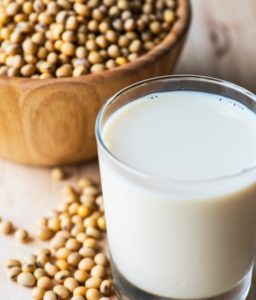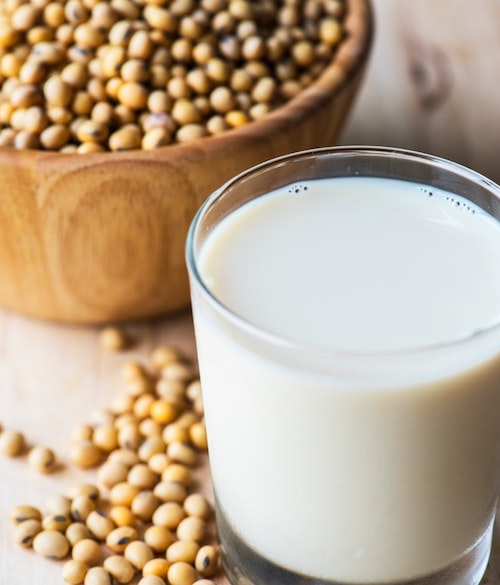Soy protein foods could lose the heart health claim status that was granted in 1999 if the FDA moves forward with a proposal for revocation. Despite studies supporting the cholesterol-lowering effects of soy from multiple meta-analyses from 1995 to current times, the agency has expressed concerns that the effects of soy on LDL-C are too modest to be clinically significant. The FDA proposed that a qualified-health claim is more appropriate. This proposal is drawing concern from cardiologists and experts who support plant-based diets for heart health and cholesterol reduction.
“While some evidence continues to suggest a relationship between soy protein and a reduced  risk of heart disease – including evidence reviewed by the FDA when the claim was authorized – the totality of currently available scientific evidence calls into question the certainty of this relationship,” said Susan Mayne, Ph.D. in an FDA statement in 2017. “For example, some studies, published after the FDA authorized the health claim, show inconsistent findings concerning the ability of soy protein to lower heart-damaging low-density lipoprotein (LDL) cholesterol. Our review of that evidence has led us to conclude that the relationship between soy protein and heart disease does not meet the rigorous standard for an FDA-authorized health claim.”
risk of heart disease – including evidence reviewed by the FDA when the claim was authorized – the totality of currently available scientific evidence calls into question the certainty of this relationship,” said Susan Mayne, Ph.D. in an FDA statement in 2017. “For example, some studies, published after the FDA authorized the health claim, show inconsistent findings concerning the ability of soy protein to lower heart-damaging low-density lipoprotein (LDL) cholesterol. Our review of that evidence has led us to conclude that the relationship between soy protein and heart disease does not meet the rigorous standard for an FDA-authorized health claim.”
Soy and plant-food cholesterol experts counter this notion saying that there are numerous trials to support the current health claim.
“The data is overwhelming that eating a whole-food and plant- based diet–which would include beans–is associated with lower rates of heart disease, says Elizabeth Klodas, MD, cardiologist, expert in food-based cholesterol reduction protocols and founder of StepOne Foods.
Dr. Klodas points out that small changes in cholesterol reduction are significant. “Even minor cholesterol reductions can have a giant impact on cardiovascular disease burden when viewed at a population level. This would clearly argue for keeping the soy claim intact, especially for whole soy products,” she says. “And the diets of individuals who live in Blue Zones (where healthy longevity is common) are all rich in beans, including soy. The analysis of Jenkins et al highlights that soy consumption has been consistently associated with cholesterol reduction, albeit minor as compared to drugs,” she says.
 Dr. Klodas suggests when soy proteins are combined with other cholesterol lowering foods, the results may be as effective as statins. “There’s no doubt that combining foods that yield minor cholesterol reductions individually can result in marked, almost synergistic lipid reductions. We have shown this in a randomized controlled clinical trial of free-living statin reluctant patients, some of whom achieved over 20% LDL reductions in 30 days by just switching out two snacks per day.”
Dr. Klodas suggests when soy proteins are combined with other cholesterol lowering foods, the results may be as effective as statins. “There’s no doubt that combining foods that yield minor cholesterol reductions individually can result in marked, almost synergistic lipid reductions. We have shown this in a randomized controlled clinical trial of free-living statin reluctant patients, some of whom achieved over 20% LDL reductions in 30 days by just switching out two snacks per day.”
The current recommendations for the cholesterol health claim include daily consumption of 25 g of soy protein. The health claim is authorized for products that contain 6.25 g of soy protein (one quarter of the median amount tested). How easy is this to consume?
- Soy milk contains 7 g of soy protein (some, such as Eden Soy, provide 12 g soy protein/cup),
- Soy yogurts contain up to 9 g/cup (Greek‐style soy yogurts are higher),
- Soy burger provides ≈12 g soy protein/patty,
- Extra-firm tofu has just >14 g soy protein in 3 oz.
Researchers, who agree with Dr. Klodas on the benefits of soy and plant-based foods, are concerned that FDA is making these recommendations without a formal meta-analysis to support the revocation. So, they set out to do the homework for the FDA and recently published their work in the Journal of the American Heart Association. The following is a summary, followed by a link to the full text study.
Abstract / “Researchers performed a cumulative meta‐analysis on the 46 soy trials identified by the FDA to determine if at any time, since the 1999 FDA final rule that established the soy heart health claim, the soy effect on serum cholesterol lost significance. The cumulative meta‐analysis for both total cholesterol and low‐density lipoprotein cholesterol demonstrated preservation of the small, but significant, reductions seen both before and during the subsequent 14 years since the health claim was originally approved.”
“For low‐density lipoprotein cholesterol, the mean reduction in 1999 was −6.3 mg/dL (95% CI, −8.7 to −3.9 mg/dL; P=0.00001) and remained in the range of −4.2 to −6.7 mg/dL (P=0.0006 to P=0.0002, respectively) in the years after 1999. At no time point did the total cholesterol or low‐density lipoprotein cholesterol reductions lose significance or were the differences at individual time points in the cumulative meta‐analysis significantly different from those seen in 1999 when the health claim was approved.”
A Deeper Dive into the Results
The researchers say that at a time when government agencies worldwide are recommending consumption of plant foods, especially plant protein foods, soy is an important plant protein source. “A major concern is that if the FDA is now to use this same approach (on the basis of its 2009 ruling) for the remaining heart health claims, then the claims for nuts, viscous fibers (ie, oats, barley, and psyllium), and plant sterols could also be revoked because these effects on serum cholesterol are also modest and variable in terms of individual study statistical significance,” write the researchers.
Below is a quick synopsis of the research findings in JAHA:
- A significant reduction in TC with soy protein was seen in 1999, at the time of the FDA heart health claim, of −4.5 mg/dL (95% CI, −8.1 to −1.0 mg/dL; P=0.01).
- Significance was maintained over the following 14 years and ranged from a minimum reduction of −4.0 mg/dL (95% CI, −6.7 to −1.3 mg/dL; P=0.004) in 2001 to a maximum reduction of −7.7 mg/dL (95% CI, −11.2 to −4.3 mg/dL; P<0.0008) in 2006 (Click to Figure 1).
- The corresponding effect estimate for LDL‐C was −6.3 mg/dL (95% CI, −8.7 to −3.9 mg/dL; P<0.00001) in 1999; and in the following 14 years, the estimates ranged from a minimum reduction of −4.2 mg/dL (95% CI, −6.6 to −1.8 mg/dL; P=0.0006) in 2006 to a maximum reduction of −6.7 mg/dL (95% CI, −10.2 to −3.2 mg/dL; P=0.0002) in 2002 (Click to Figure 2).
- At no point over the 14 years since the initial FDA heart health claim did the significance level for either TC or LDL‐C fall below P=0.002 (Click to Figures 1 and 2), nor was there a significant deviation at any time from the values of 1999, at the time when the FDA soy heart health claim was granted (Click to Figures 1 and 2).
Other critical points the researchers call out for maintaining the claim:
- Researchers are fearful that removal of the health claim will reduce public awareness of useful foods for cholesterol control. This study shows that a combination of foods, under metabolically controlled conditions, may reduce LDL‐C and CRP (C‐reactive protein) similarly to a statin (lovastatin) by ~30%.
- The FDA made its current recommendations on 238 intervention studies, of which it considered 58 to be well‐designed studies, 12 that mentioned blood pressure and 46 that mentioned blood TC or LDL‐C. The researchers note: “Studies were eliminated if they had no control group, there was no statistical comparison between the test and control group, total fat intakes were different between treatments, or the saturated fat, dietary cholesterol, and fiber were not balanced between the test and control arms. The level of tolerance for differences between treatments in these nutrients was not defined, and it may be that otherwise reasonable studies with small treatment differences in fiber or dietary cholesterol might still have been acceptable and have strengthened the conclusions.”
- Also, some negative studies were included, such as Jenkins et al, in which soy flour was added to high‐temperature extruded breakfast cereal, which may have damaged the soy protein structure and the formation of browning reaction products between the starch and soy amino acids. These interactions are known to reduce the effectiveness of soy protein. Despite inclusion of these studies, the overall effect of soy was the same.
An issue that must be addressed by FDA is the use of ultra-processed soy in foods that do not measure up to the health benefits of soy proteins yet still carry the health claim. “What is problematic is when highly processed foods that do not align with recommended healthy dietary patterns contain ≥6.25 g of soy protein per reference amount and, therefore, qualify for the health claim,” wrote Kristina S. Petersen, PhD, APD, from Pennsylvania State University on an editorial commentary in JAHA. “Although meeting the health claim criteria, this is not consistent with the spirit of the Nutrition Labeling and Education Act, specifically to help consumers make healthy food choices. Examples of such products include protein snack bars, protein powders, and other protein enriched foods. Health claims can lead to positivity bias or health halo effects, so this issue should be considered,” she writes.
The researchers admit that the weakness of this study is that it is not a systematic review (followed by a meta‐analysis) because no systematic review of the literature was undertaken by FDA. Rather the 46 studies identified by the FDA for their determination were used without prior selection and comprehensive review of the literature by the authors.
The strength of this study is that it used the exact data on which the FDA is basing its judgment. Furthermore, a cumulative meta‐analysis was undertaken to determine when, or if, the TC or LDL‐C reductions lost significance.
Conclusion / The researchers conclude that soy continues to have a significant, if modest, effect in reducing serum LDL‐C as a cardiovascular disease risk factor. The effect of soy alone is modest, but it may produce a clinically meaningful reduction when combined in the diet with other FDA‐approved cholesterol‐lowering foods. Furthermore, at a time when plant protein sources are required, soy protein provides a useful plant protein source for the food industry, with a range of applications and with the production of heart healthy foods being one of them.
Click Here for Full JAHA Text Study
Click Here for Food Versus Statin Study
Source: Jenkins DJA, Blanco Mejia S, Chiavaroli L, Viguiliouk E, Li SS, Kendall CWC, Vuksan V, Sievenpiper JL. Cumulative Meta-Analysis of the Soy Effect Over Time. J Am Heart Assoc. 2019 Jul 2;8(13):e012458. doi: 10.1161/JAHA.119.012458.
Funding Disclosure: Dr Jenkins was funded by the Canada Research Chairs Program. Dr Sievenpiper was funded by a PSI Graham Farquharson Knowledge Translation Fellowship, Diabetes Canada Clinician Scientist Award, and Banting & Best Diabetes Centre (BBDC) Sun Life Financial New Investigator Award for Diabetes Research.





